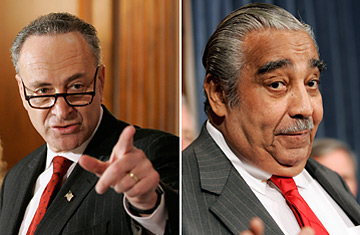
Congressional Democrats must feel a little disoriented by the emerging battle over how to pay for this year's fix for the Alternative Minimum Tax. The party that usually never misses an opportunity to portray itself as the champion of the working class suddenly isn't so wild about making a certain share of wealthy Americans pony up more cash to alleviate the impact of the AMT on millions of middle-class Americans. And for once, the Dems will be downright relieved if President Bush delivers on his veto threat, in this case effectively taking the difficult decision out of their hands.
The $50 billion measure at issue, passed last week by the House of Representatives, is the latest one-year band-aid to fix the AMT. Created in 1969 to ensure that the rich would pay at least a minimum amount of tax annually, the AMT has ended up walloping an increasing share of the middle class. This year 21 million "ordinary" Americans will be hit by it if Congress doesn't act.
Ordinarily, of course, Congress has no problem spending money it doesn't have, but this year is different. Democrats have to contend with a rule they implemented when they took control of Congress known as Pay-Go, which means they actually have to pay for things as they're approved, with either tax hikes or budget cuts. With that in mind, House Ways & Means Chairman Charles Rangel has proposed paying for the patch by raising taxes on the bonuses and fees received by hedge fund and private equity managers — which is to say the bulk of their exorbitant incomes. Right now these moneymen pay a capital-gains rate on those fees and bonuses of just 15%. If they were subject to normal income tax — the one most Americans pay — the rate would more than double to 35%.
Needless to say, Wall Street isn't turning cartwheels at the prospect, and as a result, neither are Senate Democrats. Many simply don't want to bite the hand that feeds them: investment firms and their employees have given more than $50 million to political candidates so far this cycle, 61% to Democrats, according to the Center for Responsive Politics, and their well-heeled lobbyists have been busy of late firming up opposition to the measure. Senate Finance Committee Chairman Max Baucus has said he doesn't believe the House bill could pass the Senate — and any measure has to go through his committee. Instead Baucus is looking at other ways to pay for the package, though he has yet to elaborate on what they might entail. The Senate is expected to take up the matter in December.
Republicans, for their part, are unified in their opposition to any tax hikes — even threatening a filibuster if the Dems were to bring up the House bill. "The last thing the American people need right now is a massive tax increase which would be a dangerous jolt to our economy," said Senate Minority Leader Mitch McConnell. "Congress must pass a responsible fix to this middle class tax hike, the AMT; a fix that doesn't replace one massive tax increase on Americans with another." Some G.O.P. staffers say a "clean" bill could pass the Senate this week, meaning a bill that shunts the cost to the deficit or through cost-cutting tactics (which would be incredibly difficult).
Many Dems are so loath to cede the high fiscal ground painstakingly won from the G.O.P. that they are willing to hit Wall Street with a new tax. But others have very parochial reasons to want to protect private equity. Senator John Kerry, for example, was opposed to a version of the bill that was floated this summer and only came out for this latest iteration with some fairly significant caveats. "We should do it in [a way that] avoids unintended consequence[s] and harm to other similarly structured partnerships in other fields," Kerry said. In Massachusetts the private equity firm that bought out the local Stop 'n Shop franchise has added 8,000 employees and 57 outlets, while Boston-based Dunkin' Donuts was taken over two years ago by another private equity firm. Then there is Charles Schumer of New York, who is the Senator representing Wall Street in D.C. and the man who most often asks them for money, even as he remains one of the most outspoken champions of the middle class in the Senate (he wrote a whole book on it: Positively American: Winning Back the Middle Class).
The fact that the President has vowed to veto the measure has made Democrats even less willing to go out on a limb. "Why risk losing all those contributions when the President's going to veto it anyway?" said Bob McIntyre, head of Citizens for Tax Justice. Since there won't be enough votes to override a veto, this Congress will likely have to pay for the tax fix the old-fashioned way: by adding to the deficit.
